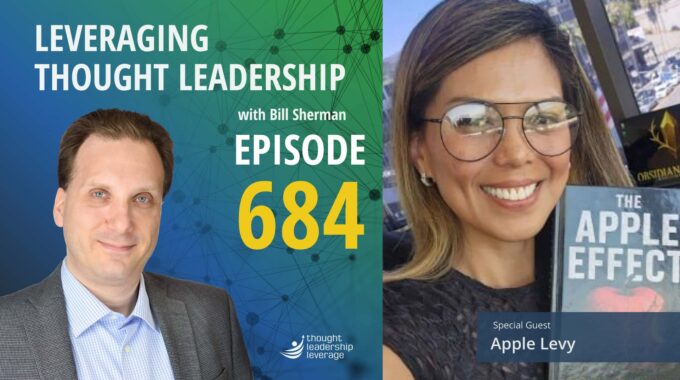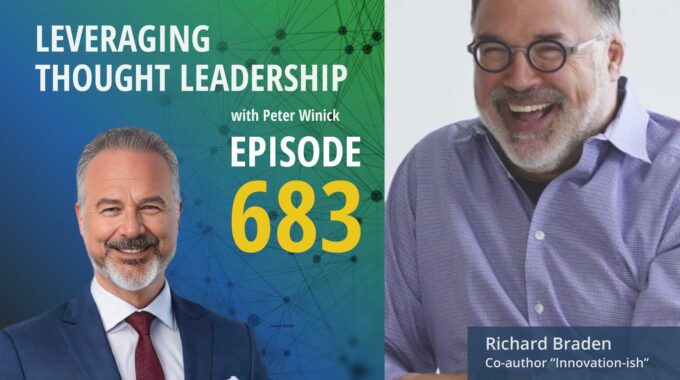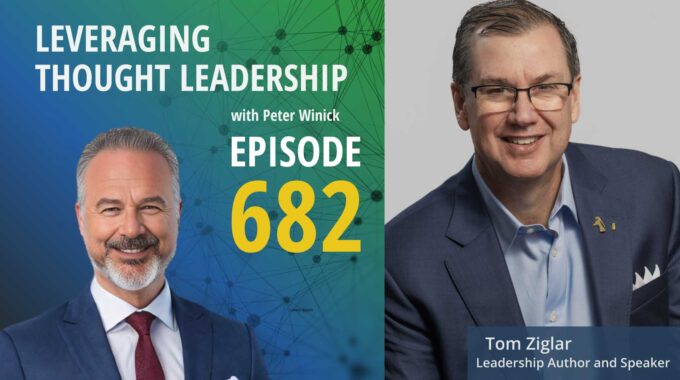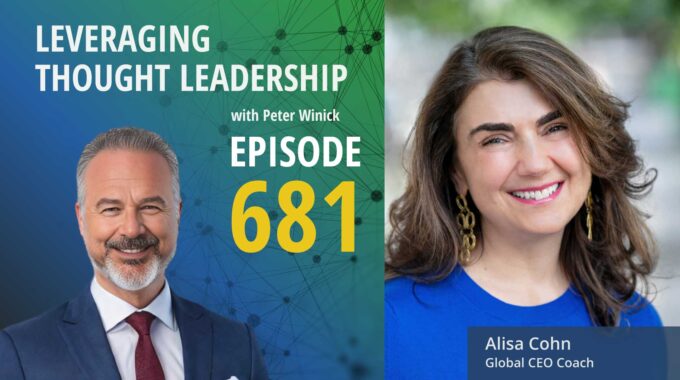A field-tested framework for leaders who want better margins, cleaner operations, and a stronger culture…
Being a Human Venn Diagram. | Christina Wallace
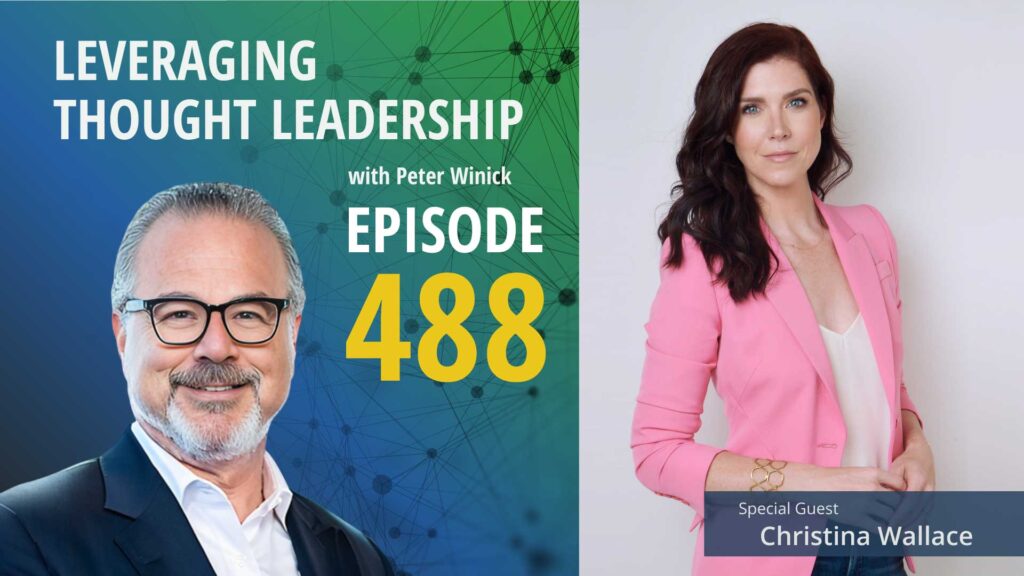
Finding your voice through creating content.
An interview with Christina Wallace about building a library of content that builds to bigger things.
What does it take to write a book?
Or host a podcast?
Or to get speaking engagements based on your content?
Being a thought leader can be hectic – if you know how to find the audience that needs you most!
Today, we’ve invited the “Human Venn Diagram,” Christina Wallace, to share her insights with our listeners. Christina has crafted a career at the intersection of business, technology, and the arts. She is a Senior Lecturer of Entrepreneurial Management at Harvard Business School, an angel investor, speaker, and author of “The Portfolio Life: How to Future Proof Your Career, Avoid Burnout, and Build a Life Bigger Than Your Business Card.”
We start our conversation by learning how Christina got started, writing bits and pieces about her best ideas and sharing them with readers and listeners. These small bits led to a column at Forbes.com, and eventually, Christina became the co-host of The Limit Does Not Exist podcast. Christina shares how each different medium helped her see different facets of her audience’s needs, and gave her real-time feedback from her audience. Those details made writing her book easier – and more suited to her audience’s needs!
Christina explains how each chapter in her book had roots in a podcast episode, and how her written posts acted as the first draft for material that then came to full maturity in the book. Not only did her previous content shape her forward motion, it also proved her talent and value to literary agents and publishers worldwide. Not only had she established a strong audience for her insights – they were actively seeking more!
Three Key Takeaways:
- You can get lucky by being in the right place at the right time. It takes courage to say yes to the opportunity presented.
- Having a library of online content is like leaving an everlasting trail of breadcrumbs that lead back to your services.
- Thought Leaders need to proactively tell the story of why they are the expert on the topics they discuss.
If you need a strategy to bring your thought leadership to market, Thought Leadership Leverage can assist you! Contact us for more information. In addition, we can help you implement marketing, research, and sales. Let us help you so you can devote yourself to what you do best.

Transcript
Peter Winick And welcome, welcome, welcome. This is Peter Winick. I’m the founder and CEO at Thought Leadership Leverage and you’re joining us on the podcast today, which is Leveraging Thought Leadership. My guest today is Christina Wallace. She’s a senior lecturer of entrepreneurial management at the Harvard Business School, an angel investor and author of The Portfolio Life How to FUTUREPROOF Your Career, Avoid Burnout and Build a Life Bigger Than Your Business Card. She is a self-described human Venn diagram, which I love that because I think more of us should be that. So I don’t think I’ve ever interviewed a diagram before, but I need to have a I don’t know, what do you start with anyway? And I’m bored today.
Christina Wallace Happy to be here.
Peter Winick So tell us a little bit about this journey into thought leadership and authorship and all the fun things you’re doing now.
Christina Wallace Sure. So this a lot of this started, I don’t know, almost ten years ago at this point. I started writing bits and pieces here and there. I always loved writing. I’m not a writer by training necessarily. I would never even use that as part of my description for a long time. But I’d write these pieces. I had ideas and I wanted to share them. And then Forbes called a few years in and said, Hey, do you want a column for Forbes.com? And I said, Sure, why not? And I ended up writing for them for four or five years. And during that time they launched their Forbes podcast network. Right? And they said, you know, we’re trying this new thing called podcasts. Do you want to do you want to host one? And so I just I got very lucky by being in the right place at the right time, but I think equally so I said yes. When opportunities were presented to share ideas and started getting the opportunity to put them out in small pieces and get real time feedback from my audience, which I think is so helpful. If I had started with the idea for a book, I think it would have felt really overwhelming. But getting to write to.
Peter Winick I like starting small. So I think I think a lot of people, you know, one of the questions I get asked a lot is where do you start? Yeah, you know, and it’s like, well, you start where you start like, so if you haven’t really dabbled or experimented with thought leadership, starting with a book is a monumental task. That’s like, I haven’t gone on a two mile hike, but Everest is on my way to wherever I’m going. Sure. So I like the way that you sort of, hey, like throw my hat in the ring, like, let’s just try podcasting and writing and then, you know, you could learn different things from blogging than you can from podcasting than you certainly can from writing a book, even though in essence, a lot of the things that you first introduced in a blog probably nurtured into maturity in the book.
Christina Wallace Absolutely. I mean, when it came time to finally write this thing, almost every chapter I had a piece or a TED Talk or an episode that I already had done on that topic, and I was able to actually go and grab that almost as my first draft. So I never had to start with a blank page, which I thought was really helpful, but equally so from a marketing standpoint, being able to sell the book, getting my agent and getting my publisher editor, I had an audience that I could point to and I had their reactions to this content that I could point to as market every day that people wanted to hear more about this.
Peter Winick Yeah. And then the that blank slate issue, I think a lot of people are scared to death of the blank slate. And I would, I would argue that from my perspective or my experience, 80 or 90% of people putting out books today, it’s 70 80%. They’re not word for word, but the concepts are there, the framings are there now. And you’ve also experimented a bit and have an understanding of what works and what doesn’t work, what’s resonated and what hasn’t resonated with the market. Could you give an example of something you put out there, or maybe in a blog or in a podcast that you thought was like or didn’t think about? Like, Okay, and I.
Christina Wallace I have a perfect example of it. So one of the forcing functions at Forbes, I hated it at the time, but ended up being really helpful is that I was forced to publish five times a month in order to get paid. You publish four times, you don’t get a penny. So I would get to the end of the month. I would be like racking my brain for one more thing that I could publish to hit my five posts. And at the end, I think it was 2016, it was on Christmas Eve, and I needed to publish one more and I wanted to be able to just log off and enjoy the holidays and all that crap. What am I going to write about? And I came up with this concept that I had been using for my own sort of end of year life and work evaluation called the Personal Balance Scorecard. And it was exactly the same fit tool that companies use. The balance scorecard applied to my health, my finances, my professional goals and my personal relationships. And so I published this. I wrote like 800 words on it.
Peter Winick I included the lazy way out, right?
Christina Wallace How to legally leave it right?
Peter Winick What did I pull that I could knock out in 5 minutes?
Christina Wallace That was that was exactly that. And I included a link to my own personal balance card, which, you know, it had some pretty transparency and a lot of transparency. You’re like, interesting. I can learn more about her like cholesterol levels. And so I publish this thing, I hit publish, I log off and I don’t even go back and look at it until the new year. And when I log back in, it has gone bonkers, blown like absolutely blown up. And the number of requests I had link to not just like posted a screenshot of my personal blogs for her, but I linked to it in like a Google spreadsheet. So it would be like editable and, well, not like my original one, but you could make your own. And I came back to hundreds of requests of people wanting to like make a copy or edited or download it for themselves. And I was like, Wow, that.
Peter Winick Would just stay there for a moment because dating is We as humans are awful at predicting what will resonate with the audiences and what won’t. So I would say, you know, you probably have 20 other pieces that you thought when you hit saying, Wow, this is my Mona Lisa, this is my Michelangelo. I spent so much brainpower and every word of this is the thing. And then it’s crickets. And then the whole, you know, cut and paste. Got to get the homework done. Yeah. You know, like, so to me, it’s like it doesn’t even pay to make the predictions anymore because the data is so quick and real time and true. Yeah, it kind of doesn’t matter what you think.
Christina Wallace Absolutely. Because seven years later people are still sending me requests for that spreadsheet.
Peter Winick This game right now, people are holding you accountable.
Christina Wallace Another holding me accountable? No, I ended up reposting it on LinkedIn oh, six months ago saying like, Hey, this is going to be a part of my book. I’m really excited to share it. And it blew up again. Oh, guys, this isn’t even novel anymore, Right?
Peter Winick Right. So you can do it literally now. And so yeah, well posted. We know you were too busy to come up with something now.
Christina Wallace Correct. But I think what ended up being really useful for me, in addition to recognizing that this was a tool that people could really benefit from and that I should absolutely include in the book was the discipline of having to write five times what forced me to sit down and write. And in those moments of like I got to, I got a phone in the homework to hold things out of me that my editor probably would know too other would die from. And I think that kind of accountability and rhythm is one of the things I recommend to anyone who’s trying to establish themselves as a thought leader or just, you know, put content on a regular basis.
Peter Winick Party accountability is different. Well, I kind of think to myself that I’ll do it five times a month and it’s like getting to the gym in 530 in the morning solo or getting your trainers waiting and you’re paying off or you’ve got, you know, there’s some sort of third party to it.
Peter Winick If you’re enjoying this episode of Thought Leadership Leverage, please make sure to subscribe. If you’d like to help spread the word about our podcast, please leave a five-star review at ratethispodcast.com/ltl and share it with your friends. We’re available on Apple Podcasts and on all major listening apps as well as at ThoughtLeadershipLeverage.com/ podcast.
Peter Winick So I want to move now to you know, you’ve got the book, you’ve got the podcast, you got Ted, you got all that like check the box, check the book. How do you measure that impact? Because that’s one thing. But the r y, right? So even, you know, for example, I have a lot of clients that have been on one of the Forbes councils or Forbes coaching or any of the other platforms this is affecting on Forbes, and we’ll go through our work together. So Oh great, you’ve been doing that for four years ex articles of mine, blah, blah, blah, and I can easily do the math. Okay, so that represents x 525% over five years. Show me the r y justify your case. Let’s pretend this was, you know, a publicly traded company. And one of the visions fighting another division for resources is why should we reallocate against that way? And shockingly, a lot of folks can’t really question. Well I mean there’s some they get yeah it’s good for the brand. Yeah. Yeah it is. And at your funeral they can say you were Forbes at like at the end of the day. But I’m going to say to you this year, you’re investing 200 hours into X, you probably say, and my expectation is to yield y. Like how do you how do you get that memo?
Christina Wallace So before I got the book contract, the metric for me really was about whether I was getting inbound opportunities that ended up being greater than the amount of effort that I was putting into my outbound work. So I do a quite a bit of public speaking. I don’t have a speakers bureau. I don’t go out there and pitch my speaking. All of my paid speaking to date has been inbound through my.
Peter Winick Business, so stay there a minute. So that’s beautiful because you can say, you know, exactly how many of your speaking gigs have come from. Mm hmm. Yeah, you can say, Great. I spent X hours and I yielded my dollars. Is that a good use of my time or not? Period ending conversation. Now it’s speaking because it tends to be high ticket. The answer is probably yes. The problem is, I think people where they’re what they’re selling, if it’s just a book or some coaching, it’s like, Wow, your customer acquisition cost is really high. Like, Yeah.
Christina Wallace So yeah, I mean, for me it’s always been sort of it is worth coming back within the next 12 months equivalent to or greater than the work I’m putting in. So when I was writing for Forbes and that was my only effort, I was getting paid in real time, I could see my, you know, my downloads, my reads, and I was getting commensurate when I did my podcast that was in first with Forbes and then with iHeart again, I had a contract and I had the real data. And then, you know, it was almost like for the for the work itself, I was keeping the lights on like I was paying enough to make it worth showing up to work in that context. And then the halo really was these inbound either speaking opportunities or sort of other opportunities to establish kind of legitimacy. And that really paid off when I landed this role at Harvard Business School to be a professor without a Ph.D.. Right. Like there’s a certain level of cachet and credibility required there. And I’m absolutely confident that my writing, my podcasting, my presence was a big part of what qualified me for this role. And now, you know, it’s not entirely a fair representation to say, my inbound as a metric for my thought leadership, because some of some of my inbound is because I’m at Harvard, not because I’m well.
Peter Winick I would also say one of the things that we’ve seen for ourselves and with our clients is there’s a flywheel effect. Like when you put out your first pick a number of 50 blogs or podcasts, you could easily justify through metrics that this is a bad use of time, right? And it’s and there is no magic number. I’m just throwing out 50 guys. It’s a big number, represents a lot of time. And you could look at the data and look at that and go, Jesus is depressing, but you get through this break point and it’s not like get to 53 and you know, whatever. It’s perfect. Yeah. And you get paid dividends. Yeah. On old asset. So I had I think it was last month or the month before, two different people reach out from a webinar that I did two years ago that was archived with the group that they’re with that I, I mean, I remember cleaning it up. I’m like, Why? It’s like, that’s really weird, right? Because somebody in their group mentioned they said this was a good piece, another one last week. So sometimes you find, you know, people are coming to you based on it doesn’t expire, particularly with blogs and the type of things you’re doing. You’re not writing, you know, sports score that that goes to the bottom of the parakeet cage, Right.
Christina Wallace Yeah. I mean, there’s part of you have to leave the breadcrumbs for people to find you. And one of the things that that I have done and that I really espouse is sort of the opposite of, I guess, the general advice on this. I don’t pick a lane and only talk about that topic. I write about. I talk about I go on podcasts about a wide range of. Things that I happen to be interested in and might consider or not.
Peter Winick But one of the things I know there are exceptions to this. One of the things that’s a really hard core tenet in our beliefs and our working with our clients is I call it solve for x. Christina is the x woman. What does that mean? It’s a pure client. We go through this whole strategy process. We figure that out. And part of the reason is it’s just the world is so noisy and I need to know. And again, there are exceptions. Adam Grants an exception, Malcolm Gladwell is an exception, etc. where, you know, if I left the station in the car at Jazz and got back in the next day and it was punk rock, I’d be like, Whoa, what’s up with that? It’s that sort of broken expectations. So even though you say you speak on different things thematically, what’s the is there connective tissue? Because it’s not like pancake recipes, right? Like, yeah, I mean.
Christina Wallace Part of my connective tissue I’ve created, which is I’m a human Venn diagram and I create my core. That’s right. Like, that’s my ex. I say, look, look, I talk about business, I talk about technology, I talk about the arts. I have been included in a recipe book. It was a South by Southwest speakers recipe book. I think there’s a banana bread recipe in there.
Peter Winick I think that if you if you’re if your platform is the human Venn diagram.
Christina Wallace It’s kind of in some ways I back sold for that to be honest. Yeah. I’ve given a TED talk on how I met my husband on online dating. I created a sales funnel to like create a process and, and figure out my qualified leads and move people through the pipeline. And I’m, you know, I met my husband and I, I gave that TED talk a little bit as a joke. Like they had come to me saying we’re trying to add a little bit more of fun and spice into what is otherwise a very serious week. Do you have something funny you could talk about for 5 minutes? And I was like, sure, let me tell you about how I met my husband and online dating. And that TED Talk has two and a half million views, right? Like I now get called to be a, you know, an expert.
Peter Winick I was.
Christina Wallace Kidding.
Peter Winick Okay. Well, that’s how I was going to ask. But are they calling you Because this cross-pollination, this Venn diagram, itchiness, or do they say, I mean, do you really want to be the guru on online dating?
Christina Wallace No, but I can talk about the business model of online dating, and it goes back to entrepreneurship and how, you know, the attention economy has shifted. So I guess my argument is not necessarily that you can could or should kind of splatter your energy everywhere. It’s more of like think really creatively about all the different pieces that make you or the things that you might be an expert on and how they could tie back to the ex of whatever that you want to be known for.
Peter Winick But this almost sounds like a politician to some degree. Oh, so will you or will you’re not vote on this bill? And I’m like, well, let me tell you about this tree over here for, you know, Army vets.
Christina Wallace I mean, it really depends on the context of the bill, I suppose. But so I say, you know, craft the narrative that serves you. And if you were to look at my resume, it would make no sense. If you looked at my LinkedIn, you would make no sense unless or until I tell you the story connecting those dots. So I think anyone who wants to be a thought leader has to proactively connect the dots of why and how they’re speaking about the topics they’re speaking on. If you can tell me that story, it doesn’t have to be linear or obvious or focused as long as you can connect the dots. For me, that’s my argument, right?
Peter Winick So but if you use LinkedIn or your resumé, that sort of lines up more to a traditional job applicant. I was an engineer. Now I’m a systems, right? Like more of a logical word lover. That being said, who’s hiring you to do what? So like what? Right. So what does that like? Speaking is speaking, but what types of groups and what things and what are the other? What are the underlying business models here that everything’s feeding into?
Christina Wallace Sure. I mean, I get invitations to speak on innovation and entrepreneurship. My first book was about how big companies can sort of steal and adapt the mindsets and skills of startups and VCs. So that was a big part of my speaking for a very long time. How can big companies be entrepreneurial? Now I’ve got a book about basically how to build the startup of you, how to how to build a portfolio, a business model for your life gives you work, rest, hobbies, relationships, community, all of these things in a way that fits together. And then I’ve done a wide variety of speaking beyond that, where I talk about the future of work talent management. I I’ve talked about how to pivot careers from more of an individual standpoint, how to come from a nontraditional background and make it into a more obvious, you know, traditional line of work like I have done. So I’m kind of all over the place and that’s what gets me out of bed in the morning. If I had to give the same stump speech 20 times to 20 different companies, I wouldn’t be doing this anymore.
Peter Winick Got it. So bit of an. So as we wrap up here. But it’s working lesson. That’s all that matters.
Christina Wallace It’s my contrarian view.
Peter Winick Yeah, no, I love it. So as we wrap up, what would you say to someone listening that’s in a position that you were maybe three or four years ago, a little bit earlier in the journey, because they’re out there. What if I do this? Don’t do this. Don’t listen. Anybody but me.
Christina Wallace I mean, my biggest advice is figure out what is unique about your voice. What is your experience, your advice, your tone, the voice that you share those stories and those takeaways in. Figure out what makes you stand out. And to do that, you just have to put a lot of content out in the world. Use LinkedIn, go on other people’s podcast as a guest, Give talks where you can like just put a lot of work out there and find that voice. One thing you’ve noticed it. Voice, Right? No. Absolutely.
Peter Winick Yeah. So I would say one of the common threads that I’m picking up from this conversation is not necessarily the it, but the how. Like you have a unique style voice, whether you analyze data the way that you look at things, whether applying it to future work online, whatever, whatever. So that’s interesting. Cool. Well, this has been this been great. I appreciate your time. I appreciate sharing your journey with us. Thank you so much, Christina.
Christina Wallace Absolutely. Thank you for having me, Peter.
Peter Winick To learn more about Thought Leadership Leverage, please visit our website at ThoughtLeadershipLeverage.com to reach me directly. Feel free to email me at Peter at ThoughtLeadershipLeverage.com and please subscribe to Leveraging Thought Leadership on iTunes or your favorite podcast app to get your weekly episode automatically.


